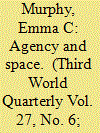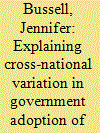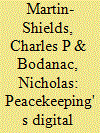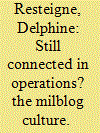|
|
|
Sort Order |
|
|
|
Items / Page
|
|
|
|
|
|
|
| Srl | Item |
| 1 |
ID:
074912


|
|
|
|
|
| Publication |
2006.
|
| Summary/Abstract |
Recent political reforms in the Gulf Arab countries have been variously understood as regime survival strategies, correlates of economic globalisation, and even the end result of US pressure to democratise. This paper examines the possible role played by the introduction of modern information and communication technologies (icts) in stimulating political liberalisation in the Gulf Arab states. Rather than attempting to quantify their democratising impact, this paper utilises the concept of agency, examining how the range of agents of ict production and diffusion in the region have sought to influence the actual impact upon political space. It concludes that modern icts have demonstrated the potential to expand the existing public sphere, and to create new opportunities for liberal political activity. However, the particular configuration of agency in the countries in question has meant that the state and its allies have retained a significant degree of control over the extent and nature of the political space, a process in which local society may have in some instances collaborated. Thus, while the introduction and diffusion of new icts may have contributed to the pressures which led to some of the political reforms in evidence in the Gulf Arab states, one cannot argue that they amount, at least as yet, to a sustained and effective attack on illiberal political structures. The first part of this paper surveys the existing body of literature in an effort to devise a framework for the subsequent study of two principal contemporary icts (satellite television and the internet) in the Gulf Arab states.
|
|
|
|
|
|
|
|
|
|
|
|
|
|
|
|
| 2 |
ID:
096375


|
|
|
|
|
| Publication |
2010.
|
| Summary/Abstract |
From the establishment of the United States Postal Service and the invention of the telegram, to the introduction of C-SPAN and the explosion of the Internet, the development of new communication technologies has always affected the functioning of Congress. Not surprisingly, recent innovations such as e-mail and social networking have spurred Congress to alter the way it operates as an institution, and rethink the manner in which it engages the public. In this brief examination, I discuss recent changes in congressional behavior and practices due to technological innovation, specifically the proliferation of social networking Web sites. Then, I cautiously predict future trends in the use of social networking and related technologies as they become more integrated in congressional offices and increase the capacity for more robust internal and constituent communications over time.
|
|
|
|
|
|
|
|
|
|
|
|
|
|
|
|
| 3 |
ID:
109111


|
|
|
| 4 |
ID:
103318


|
|
|
|
|
| Publication |
2011.
|
| Summary/Abstract |
New information and communication technologies provide governments with opportunities to deliver public services more effectively to their citizens. But we know little about the reasons for variation in the adoption of these technologies across countries. Using cross-national data on government use of information technologies to reform public service delivery, or eGovernment, I argue that politicians' expectations about the effects of more transparent service delivery on established patterns of rent-seeking play an important role in shaping variation in the character of reforms. I show that the level of preexisting corruption in a country is a robust predictor of eGovernment outcomes, with more corrupt governments less likely than their less corrupt peers to implement high-quality public service reforms using information technology. This finding contrasts with those analyses that emphasize the role of economic conditions or regime type in explaining technological diffusion.
|
|
|
|
|
|
|
|
|
|
|
|
|
|
|
|
| 5 |
ID:
159145


|
|
|
|
|
| Summary/Abstract |
Peacekeeping operations, mandated through the United Nations and regional bodies, play an increasingly diverse role in the economic development of post-conflict countries. A key way that missions can use their administrative capacity to support economic recovery is developing effective technology use and acquisition strategies in host countries, which is a peacekeeping-wide policy goal outlined in the high-level Performance Peacekeeping report. Our paper introduces the theoretical channels through which missions’ use of information communication technologies (ICTs) can support local economic development in post-conflict settings, making a theoretical argument that draws on both the literature on ICTs in peacekeeping and in economic development. We specify a Cobb–Douglas model that describes the potential impact of peacekeeping mission-led ICT investment on longer term economic development in combination with statistics on mission technology spending and internet use in host countries, providing a formal scaffold for our theoretical argument. Using this model and data in combination with a case study of the Central African Republic-based United Nations Multidimensional Integrated Stabilization Mission in the Central African Republic mission, we argue that peacekeeping missions should use their purchasing power and stabilizing influence to attract value-added technology investment to support economic development.
|
|
|
|
|
|
|
|
|
|
|
|
|
|
|
|
| 6 |
ID:
100020


|
|
|
|
|
| Publication |
2010.
|
| Summary/Abstract |
With the development of new information and communication technologies, military organizations are confronted with a proliferation of new informal channels used by soldiers, such as military blogs (or 'milblogs'). These consist of small websites created by defence personnel around military topics. Because they have the potential to reach a large audience, milblogs have become influential and, sometimes, controversial, pushing military organizations to be more open but also to try to control them. This article first describes the new forms of communication in the military, both at the institutional and at the individual level. Next it discusses the use of milblogs among Belgian soldiers in the field and the wider role played by the internet in operations, both as an information tool and a way to break the routine of the mission. Finally it examines how these information flows, while offering more diverse perspectives, also compete with official bureaucratic channels and elements of military culture.
|
|
|
|
|
|
|
|
|
|
|
|
|
|
|
|
|
|
|
|
|